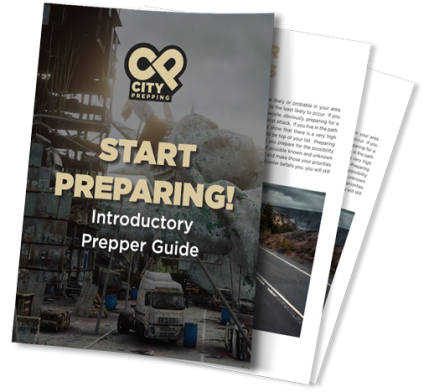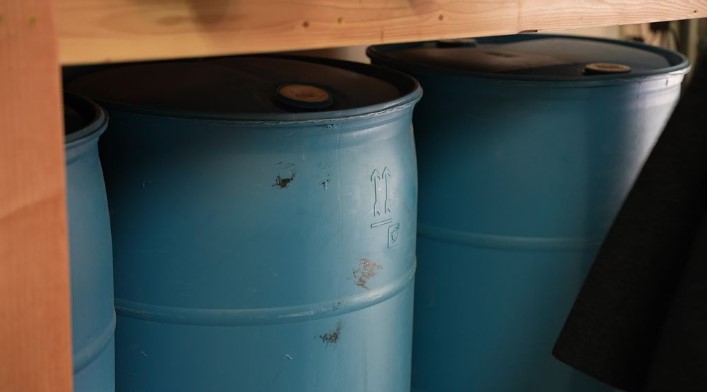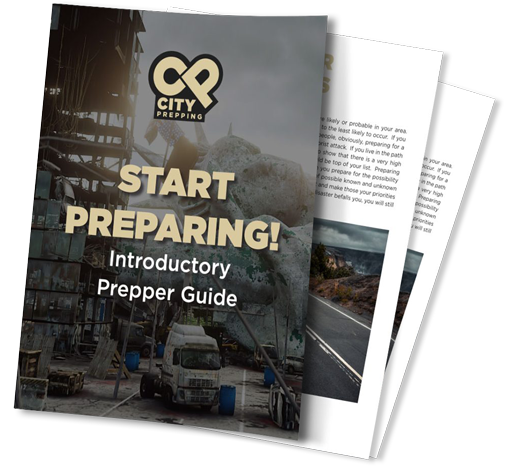 The news media won’t cover it. Your politicians and leaders won’t admit it, but there is no denying it now. We are in the second year of what is effectively a world war. That might come as a shock to some and obvious to others. The Cold War has exploded into a hot war on multiple fronts worldwide, with more hot zones potentially being dragged shortly. Your nation’s treasure flows into this war, and your soldiers might eventually be directly engaged. In this video, I will explain how this world war is like no other we have ever seen, how it might never end, and what you should be paying attention to now with how you prepare to give yourself the greatest chance of enduring it. There’s a lot to analyze and explain here, so let’s dive in…
DIFFERENT WARTIME ECONOMY
The news media won’t cover it. Your politicians and leaders won’t admit it, but there is no denying it now. We are in the second year of what is effectively a world war. That might come as a shock to some and obvious to others. The Cold War has exploded into a hot war on multiple fronts worldwide, with more hot zones potentially being dragged shortly. Your nation’s treasure flows into this war, and your soldiers might eventually be directly engaged. In this video, I will explain how this world war is like no other we have ever seen, how it might never end, and what you should be paying attention to now with how you prepare to give yourself the greatest chance of enduring it. There’s a lot to analyze and explain here, so let’s dive in…
DIFFERENT WARTIME ECONOMY
 In previous world wars, countries committed resources, retooled their factories, and recruited a fighting force of citizens in their armies. Countries adopted what came to be known as a “Wartime Economy.” For example, before World War II, factories in the United States turned out automobiles, large and small appliances, and children’s toys. In January 1942 — a mere month after the attack on Pearl Harbor, Hawaii — President Franklin D. Roosevelt ordered the establishment of the War Production Board that would press these factories into the war effort. Even before this, industrialists were pressured into moving away from their civilian industrial efforts to build instead ships, tanks, and planes for the war effort.
However, this current world war is different because it is mainly supplied through surplus, trade, and bribes. You can see this most clearly in the flow of 155mm shells, the preferred weapon of choice in this war. When Russia was burning through its supplies, firing an estimated 40,000 of these explosive rounds daily, they turned to North Korea to supply them with millions more. Ukraine is firing upwards of 8,000 of these rounds daily and has been supplied by the US with more than 1.5 million rounds already. To ship that many, the US has agreed with South Korea to source a half-million of the rounds. Only recently has the US Army sought to ramp up their own production of the shells sixfold to 85,000 a month. There is a point where supplies and trades are insufficient to supply the warzone, and a wartime economy adequately has to be adopted. Still, economies are very different today than they were three-quarters of a century ago, at the end of World War II.
It’s not just 155mm shells, though those are the most obvious to track. The flow of wartime parts is coming from all over the world. Russia is being supplied with bearings for their tanks from China and Uzbekistan. Without the bearings, Russia’s war and ability to supply it would immediately end. Without bearings, there are no more Russian railways or tanks. China has also provided rifles, body armor, and drones. Egypt had secretly planned to give 40,000 missiles to Russia before their efforts were disrupted. North Korea and Iran have both provided weapons and personnel to operate them. The US is providing targeting reconnaissance to Ukrainian forces, and billions of dollars of weaponry have moved into Ukraine from NATO countries. Many of these weapons, like missiles, have ranges that far exceed anything used in any previous world war, and we have already seen where they have fallen in countries not directly involved in the conflict. Any one of these instances could result in an immediate escalation of the conflict.
In a way, your country is already adopting a wartime economy even though there is no official declaration of war, and you may not have boots on the ground in the war zone. Russia’s invasion of Ukraine and fears of China pushed military spending to a record high in 2022 throughout Europe and America. With previous wars, citizens were mobilized to collect resources for the war effort, sell bonds, save aluminum and rubber, and work in factories to support the effort. While countries haven’t come to that level of mobilization at this point, in a way, we are feeling this impact. LNG exports from the US to Europe have increased a staggering 141% to support allies in Europe cutoff from Russian liquid natural gas. That creates a supply imbalance in the US and has forced the prices up, requiring consumer conservation efforts. So, the wartime economy of the past may look different today. However, like it or not, your country is slowly adopting a wartime economy.
NEW SOLDIERS IN WW3
In previous world wars, countries committed resources, retooled their factories, and recruited a fighting force of citizens in their armies. Countries adopted what came to be known as a “Wartime Economy.” For example, before World War II, factories in the United States turned out automobiles, large and small appliances, and children’s toys. In January 1942 — a mere month after the attack on Pearl Harbor, Hawaii — President Franklin D. Roosevelt ordered the establishment of the War Production Board that would press these factories into the war effort. Even before this, industrialists were pressured into moving away from their civilian industrial efforts to build instead ships, tanks, and planes for the war effort.
However, this current world war is different because it is mainly supplied through surplus, trade, and bribes. You can see this most clearly in the flow of 155mm shells, the preferred weapon of choice in this war. When Russia was burning through its supplies, firing an estimated 40,000 of these explosive rounds daily, they turned to North Korea to supply them with millions more. Ukraine is firing upwards of 8,000 of these rounds daily and has been supplied by the US with more than 1.5 million rounds already. To ship that many, the US has agreed with South Korea to source a half-million of the rounds. Only recently has the US Army sought to ramp up their own production of the shells sixfold to 85,000 a month. There is a point where supplies and trades are insufficient to supply the warzone, and a wartime economy adequately has to be adopted. Still, economies are very different today than they were three-quarters of a century ago, at the end of World War II.
It’s not just 155mm shells, though those are the most obvious to track. The flow of wartime parts is coming from all over the world. Russia is being supplied with bearings for their tanks from China and Uzbekistan. Without the bearings, Russia’s war and ability to supply it would immediately end. Without bearings, there are no more Russian railways or tanks. China has also provided rifles, body armor, and drones. Egypt had secretly planned to give 40,000 missiles to Russia before their efforts were disrupted. North Korea and Iran have both provided weapons and personnel to operate them. The US is providing targeting reconnaissance to Ukrainian forces, and billions of dollars of weaponry have moved into Ukraine from NATO countries. Many of these weapons, like missiles, have ranges that far exceed anything used in any previous world war, and we have already seen where they have fallen in countries not directly involved in the conflict. Any one of these instances could result in an immediate escalation of the conflict.
In a way, your country is already adopting a wartime economy even though there is no official declaration of war, and you may not have boots on the ground in the war zone. Russia’s invasion of Ukraine and fears of China pushed military spending to a record high in 2022 throughout Europe and America. With previous wars, citizens were mobilized to collect resources for the war effort, sell bonds, save aluminum and rubber, and work in factories to support the effort. While countries haven’t come to that level of mobilization at this point, in a way, we are feeling this impact. LNG exports from the US to Europe have increased a staggering 141% to support allies in Europe cutoff from Russian liquid natural gas. That creates a supply imbalance in the US and has forced the prices up, requiring consumer conservation efforts. So, the wartime economy of the past may look different today. However, like it or not, your country is slowly adopting a wartime economy.
NEW SOLDIERS IN WW3
 World Wars of the past required countries to send their sons, daughters, and treasure overseas or to other countries to fight with boots on the ground. When one side lost too many sons, daughters, and treasure, wars would end with a victor and the defeated. Technology and stockpiles of ordinance-collecting dust have changed that dynamic. The Wagner Group, a private mercenary group that takes its orders directly from the Kremlin, is currently being led by Yevgeny Prigozhin, Putin’s close friend.
The US Treasury Department designated Wagner Group as a transnational criminal organization. One of the reasons they did this is because they are functioning beyond international rules and laws. They are recruiting prisoners under duress from Russia. It’s far from a disciplined fighting force apt to follow established international codes of conduct.
Though private military companies, PMCs, are officially banned in Russia, the Wagner Group is directly employed and funded by the Kremlin. Think of them as Putin’s personal Brute Squad. The Wagner Group allows Russia to enact foreign policy beyond any accepted international laws, rules, or norms. Countless allegations, video evidence, and sworn testimonials reveal this group frequently tortures and murders civilians and prisoners of war. Obviously, this violates the Geneva Conventions. Russia can and does deny having any part of these human rights violations because, if true, the actions were taken by a contractor and not the Russian Federation. The group has sought weapons and ammo from Turkey and other countries.
PMCs aren’t unique to Russia–think Blackwater–but Putin has definitely leveled them up and removed a layer of accountability with Wagner Group. The mere existence and scope of this PMC make comparisons to previous world wars problematic. There’s no wave of national armies storming beaches or skirting the Maginot Line. Instead, ununiformed infiltrators and saboteurs are crossing borders and engaging in subterfuge meant to destabilize other countries. The fall of Crimea was preceded by an invasion of unknown armed men, often referred to as “little green men,” who were later proven to be Russian soldiers. The tactic works, and Putin uses it to his full advantage to wage war with impunity worldwide. It’s worked so well that PMCs may one day replace the standing Russian army if they haven’t already. It can be assumed when the Wagner Group receives too much bad publicity on the world stage, they will be absorbed into some different PMC formulation. Blackwater, after all, is on its third name change.
This matters to you because, like it or not, there is a world war being waged through these PMCs. Members of these groups could be in any country where they can gain assets or recruits. Typically, they are actively recruiting from any country that harbors anti-western sentiments. This should matter to you also because they are in any country where Putin has the intention of creating chaos or destabilization. The Wagner Group is even seeking to recruit fighters in European territories and around the globe for what it dubs a “mystery” plan. Any way you examine it, it is a state-sponsored terrorist group that is larger, better funded, and more organized than Al Qaeda was. That should be a concern to you. If a country doesn’t have its own sons and daughters with boots on the ground in the conflict zone, in the past, it could say it wasn’t involved in the war. That’s no longer a defining characteristic of the soldiers in this war.
EVER-ESCALATING & NEVER-ENDING
World Wars of the past required countries to send their sons, daughters, and treasure overseas or to other countries to fight with boots on the ground. When one side lost too many sons, daughters, and treasure, wars would end with a victor and the defeated. Technology and stockpiles of ordinance-collecting dust have changed that dynamic. The Wagner Group, a private mercenary group that takes its orders directly from the Kremlin, is currently being led by Yevgeny Prigozhin, Putin’s close friend.
The US Treasury Department designated Wagner Group as a transnational criminal organization. One of the reasons they did this is because they are functioning beyond international rules and laws. They are recruiting prisoners under duress from Russia. It’s far from a disciplined fighting force apt to follow established international codes of conduct.
Though private military companies, PMCs, are officially banned in Russia, the Wagner Group is directly employed and funded by the Kremlin. Think of them as Putin’s personal Brute Squad. The Wagner Group allows Russia to enact foreign policy beyond any accepted international laws, rules, or norms. Countless allegations, video evidence, and sworn testimonials reveal this group frequently tortures and murders civilians and prisoners of war. Obviously, this violates the Geneva Conventions. Russia can and does deny having any part of these human rights violations because, if true, the actions were taken by a contractor and not the Russian Federation. The group has sought weapons and ammo from Turkey and other countries.
PMCs aren’t unique to Russia–think Blackwater–but Putin has definitely leveled them up and removed a layer of accountability with Wagner Group. The mere existence and scope of this PMC make comparisons to previous world wars problematic. There’s no wave of national armies storming beaches or skirting the Maginot Line. Instead, ununiformed infiltrators and saboteurs are crossing borders and engaging in subterfuge meant to destabilize other countries. The fall of Crimea was preceded by an invasion of unknown armed men, often referred to as “little green men,” who were later proven to be Russian soldiers. The tactic works, and Putin uses it to his full advantage to wage war with impunity worldwide. It’s worked so well that PMCs may one day replace the standing Russian army if they haven’t already. It can be assumed when the Wagner Group receives too much bad publicity on the world stage, they will be absorbed into some different PMC formulation. Blackwater, after all, is on its third name change.
This matters to you because, like it or not, there is a world war being waged through these PMCs. Members of these groups could be in any country where they can gain assets or recruits. Typically, they are actively recruiting from any country that harbors anti-western sentiments. This should matter to you also because they are in any country where Putin has the intention of creating chaos or destabilization. The Wagner Group is even seeking to recruit fighters in European territories and around the globe for what it dubs a “mystery” plan. Any way you examine it, it is a state-sponsored terrorist group that is larger, better funded, and more organized than Al Qaeda was. That should be a concern to you. If a country doesn’t have its own sons and daughters with boots on the ground in the conflict zone, in the past, it could say it wasn’t involved in the war. That’s no longer a defining characteristic of the soldiers in this war.
EVER-ESCALATING & NEVER-ENDING
 When a war is waged with shadowy entities like private military groups; when a war is funded through surplus, shady deals, exchanges, and promises; when countries commit to the war effort by rechanneling their resources and treasure to it; when a war involves multiple countries on multiple secret fronts, it meets the definition of a world war. The part that should matter most to you is this is an ever-escalating conflict that can have no resolution short of the collapse of one of the major parties–Ukraine, Russia, the United States, Europe, or China. One of these significant entities imploding or changing leadership could destabilize the concentrated war efforts long enough for a single victor to emerge. Short of that outcome, however, where does a war like this really stop? Cyberattacks and destabilization efforts escalate. These attacks and the chaos they create move far from the warzone and impact people and operations worldwide.
More frontlines in the war emerge, though, at first glance, they seem unrelated. Already, it is surfacing that the Wagner Group is a crucial player in the conflict in Sudan. In fairness, this is a long-standing generational conflict in Sudan, but the Wagner Group’s fingerprints are clearly on this chapter of it. The two warring generals have both been supplied by the Wagner Group. Russia has secured mining rights to Sudanese gold mines and has an agreement to build a Red Sea Naval naval base. The problem is that to build the naval base, parliamentary approval is required, and Sudan would need to form a civilian parliament first. The machinations of democracy take longer than Russia is willing to endure, but whichever friendly, Wagner-supported, warring general seizes power, and regardless of what genocide takes place with Wagner-supplied weapons, an authoritarian general is much more likely to approve a Russian naval base than a freely established parliament. Russia, China, and the US are still bribing allegiance, support, and passive acceptance of their policy and actions from smaller countries at this point. For instance, Russia is poised to deliver free of charge up to 500,000 metric tons of grain to the poorest nations of Africa in the coming months. For Russia, it is a rerouting of grain they can’t sell elsewhere to buy goodwill and support in world organizations. Indeed, the fires of the frontlines of this world war have sprung up elsewhere– far beyond Ukraine. And Putin would love for the attention to be taken off of Ukraine and paid to any other location in the world, so expect more of these conflicts to rise anywhere poverty, famine, or political destabilization exists.
At the core of these other conflicts is the same theme– genocide, authoritarian leaders, murder, political instability, and established borders can all be ignored so long as influence and profit can be garnered. It is a very different world order than the sometimes messier democratic Western ideals. Expect that allies of Russia like Iran will redouble their efforts to fund terrorist efforts around the world. Expect more resource-rich but unstable countries to develop internal strife and conflict suddenly. A destabilized world is part of the Russian plan. Expect attacks on infrastructure or computer networks, or banking systems where no clear culprit can be identified. For instance, Chinese cyberattacks on NATO countries have increased by 116% since Russia invaded Ukraine. Linking the culprit back to a specific government will be difficult even when the culprit can be identified.
In an ever-escalating conflict like this, can peace ever be restored? If the conflict in Ukraine ends, will the private military companies just disband, or will they be absorbed into other cells, fights, and conflict zones? If the world puts out one fire, does it simply spring up somewhere else? If there is ever peace restored to Ukraine, what about Sudan? Will we see the frontlines in this amorphous conflict grow even further in Moldova or one of the 26 other countries where Russia is alleged to have been meddling politically? With a large portion of your country’s resources being channeled into a war effort somewhere else, is it just a matter of time before your country’s troops are directly pressed into a conflict?
WHAT CAN YOU DO?
When a war is waged with shadowy entities like private military groups; when a war is funded through surplus, shady deals, exchanges, and promises; when countries commit to the war effort by rechanneling their resources and treasure to it; when a war involves multiple countries on multiple secret fronts, it meets the definition of a world war. The part that should matter most to you is this is an ever-escalating conflict that can have no resolution short of the collapse of one of the major parties–Ukraine, Russia, the United States, Europe, or China. One of these significant entities imploding or changing leadership could destabilize the concentrated war efforts long enough for a single victor to emerge. Short of that outcome, however, where does a war like this really stop? Cyberattacks and destabilization efforts escalate. These attacks and the chaos they create move far from the warzone and impact people and operations worldwide.
More frontlines in the war emerge, though, at first glance, they seem unrelated. Already, it is surfacing that the Wagner Group is a crucial player in the conflict in Sudan. In fairness, this is a long-standing generational conflict in Sudan, but the Wagner Group’s fingerprints are clearly on this chapter of it. The two warring generals have both been supplied by the Wagner Group. Russia has secured mining rights to Sudanese gold mines and has an agreement to build a Red Sea Naval naval base. The problem is that to build the naval base, parliamentary approval is required, and Sudan would need to form a civilian parliament first. The machinations of democracy take longer than Russia is willing to endure, but whichever friendly, Wagner-supported, warring general seizes power, and regardless of what genocide takes place with Wagner-supplied weapons, an authoritarian general is much more likely to approve a Russian naval base than a freely established parliament. Russia, China, and the US are still bribing allegiance, support, and passive acceptance of their policy and actions from smaller countries at this point. For instance, Russia is poised to deliver free of charge up to 500,000 metric tons of grain to the poorest nations of Africa in the coming months. For Russia, it is a rerouting of grain they can’t sell elsewhere to buy goodwill and support in world organizations. Indeed, the fires of the frontlines of this world war have sprung up elsewhere– far beyond Ukraine. And Putin would love for the attention to be taken off of Ukraine and paid to any other location in the world, so expect more of these conflicts to rise anywhere poverty, famine, or political destabilization exists.
At the core of these other conflicts is the same theme– genocide, authoritarian leaders, murder, political instability, and established borders can all be ignored so long as influence and profit can be garnered. It is a very different world order than the sometimes messier democratic Western ideals. Expect that allies of Russia like Iran will redouble their efforts to fund terrorist efforts around the world. Expect more resource-rich but unstable countries to develop internal strife and conflict suddenly. A destabilized world is part of the Russian plan. Expect attacks on infrastructure or computer networks, or banking systems where no clear culprit can be identified. For instance, Chinese cyberattacks on NATO countries have increased by 116% since Russia invaded Ukraine. Linking the culprit back to a specific government will be difficult even when the culprit can be identified.
In an ever-escalating conflict like this, can peace ever be restored? If the conflict in Ukraine ends, will the private military companies just disband, or will they be absorbed into other cells, fights, and conflict zones? If the world puts out one fire, does it simply spring up somewhere else? If there is ever peace restored to Ukraine, what about Sudan? Will we see the frontlines in this amorphous conflict grow even further in Moldova or one of the 26 other countries where Russia is alleged to have been meddling politically? With a large portion of your country’s resources being channeled into a war effort somewhere else, is it just a matter of time before your country’s troops are directly pressed into a conflict?
WHAT CAN YOU DO?
 Make no mistake about it. World War 3 is already underway, though it doesn’t conform to our current understanding of past world wars. This one won’t go away as easily and may never have a clear victor. Your nation’s treasures and resources will continue to pour into the conflict, and the war is shaping up to be ever-escalating and never-ending. Your economy is transitioning to a wartime economy because if it doesn’t, your country will lose the war. Knowing this, there are things you can do now, even as the government pretends it isn’t actively engaged in a world war. Because they aren’t admitting this reality, they aren’t going to ask you to start a Victory Garden. However, the ever-escalating and never-ending conflict may disrupt food supplies. The facts are that some food supply lines will be disrupted as trade agreements are challenged, food resources are allocated elsewhere, or agriculture and shipping are challenged. Just the brewing conflict with China and their warming up to Russia through trade deals and BRICS should call into question the stability of any food sourced from China. India, China, and Russia have all been hoarding grain for the last several years, as we have pointed out on this channel. Now we know the reason was probably the war in Ukraine and the rising tensions in the South China Sea. If ever there were a time to free oneself even a fraction from global food supply chains, to source more locally, or even grow some of what you eat, this would be the time.
You should also take a critical look at your work and income. Your employment might suffer if it isn’t somehow tied to the war effort. If you work in the service industry and your nation’s resources are leveraged in a war effort, the economy suffers, and fewer people seek services. If you work for a company that manufactures anything with sourced parts from other countries, that part supply could dry up or be diverted to the manufacturing efforts. For instance, if you want to buy anything made of steel, consider how much steel is used for a 155mm projectile that weighs 103 pounds. Now multiply that by the over 1 million shells per year the US is ramping up to produce. You can imagine that steel for buildings, cars, washing machines, refrigerators, and even surgical scalpels may be in reduced supply, thus driving up their costs. The war effort has already impacted the aluminum industry, one of Russia’s chief exports, as evidenced by the recent Executive Order from the White House imposing tariffs. This is already happening right now. What will be the new price of anything made from or packaged in aluminum as a result? Anticipate more shortages and higher costs as more resources flow to the war zones and away from your country.
By extension of that, expect your economy to continue to backslide and move deeper and deeper into debt with decreasing currency valuation. Basically, you’ll need more money which will buy you fewer goods. The dollar’s value will decrease proportionally to the alternate currencies and exchanges, and inflation will continue to climb. Treat your finances as a prep, as we often encourage on this channel, and cultivate your skills and knowledge while you still can. In the future, your ability to gain new skills and knowledge might not be as easy; however, these will prove invaluable to your future self if conditions continue on the same path.
In some ways, the world has always been at war– a war of political ideologies, a cold war, and smaller revolutions and conflicts. That hasn’t changed. What has changed is the prominence and concentration of these conflicts. What has changed is the cold distance from which nations can recruit, engage in conflicts, and absolve themselves from any wrongdoing or atrocities committed on the battlefield. Eventually, the war will not be sustainable from afar with dusty stockpiles of decades-old weaponry. Eventually, to be victorious, countries must commit to boots on the ground or step aside and let someone win without their participation.
Make no mistake about it. We are engaged in a world war of epic proportions right now. You should prepare for that just as your ancestors did, even if your government still needs to acknowledge this fact.
As always, stay safe out there.
Make no mistake about it. World War 3 is already underway, though it doesn’t conform to our current understanding of past world wars. This one won’t go away as easily and may never have a clear victor. Your nation’s treasures and resources will continue to pour into the conflict, and the war is shaping up to be ever-escalating and never-ending. Your economy is transitioning to a wartime economy because if it doesn’t, your country will lose the war. Knowing this, there are things you can do now, even as the government pretends it isn’t actively engaged in a world war. Because they aren’t admitting this reality, they aren’t going to ask you to start a Victory Garden. However, the ever-escalating and never-ending conflict may disrupt food supplies. The facts are that some food supply lines will be disrupted as trade agreements are challenged, food resources are allocated elsewhere, or agriculture and shipping are challenged. Just the brewing conflict with China and their warming up to Russia through trade deals and BRICS should call into question the stability of any food sourced from China. India, China, and Russia have all been hoarding grain for the last several years, as we have pointed out on this channel. Now we know the reason was probably the war in Ukraine and the rising tensions in the South China Sea. If ever there were a time to free oneself even a fraction from global food supply chains, to source more locally, or even grow some of what you eat, this would be the time.
You should also take a critical look at your work and income. Your employment might suffer if it isn’t somehow tied to the war effort. If you work in the service industry and your nation’s resources are leveraged in a war effort, the economy suffers, and fewer people seek services. If you work for a company that manufactures anything with sourced parts from other countries, that part supply could dry up or be diverted to the manufacturing efforts. For instance, if you want to buy anything made of steel, consider how much steel is used for a 155mm projectile that weighs 103 pounds. Now multiply that by the over 1 million shells per year the US is ramping up to produce. You can imagine that steel for buildings, cars, washing machines, refrigerators, and even surgical scalpels may be in reduced supply, thus driving up their costs. The war effort has already impacted the aluminum industry, one of Russia’s chief exports, as evidenced by the recent Executive Order from the White House imposing tariffs. This is already happening right now. What will be the new price of anything made from or packaged in aluminum as a result? Anticipate more shortages and higher costs as more resources flow to the war zones and away from your country.
By extension of that, expect your economy to continue to backslide and move deeper and deeper into debt with decreasing currency valuation. Basically, you’ll need more money which will buy you fewer goods. The dollar’s value will decrease proportionally to the alternate currencies and exchanges, and inflation will continue to climb. Treat your finances as a prep, as we often encourage on this channel, and cultivate your skills and knowledge while you still can. In the future, your ability to gain new skills and knowledge might not be as easy; however, these will prove invaluable to your future self if conditions continue on the same path.
In some ways, the world has always been at war– a war of political ideologies, a cold war, and smaller revolutions and conflicts. That hasn’t changed. What has changed is the prominence and concentration of these conflicts. What has changed is the cold distance from which nations can recruit, engage in conflicts, and absolve themselves from any wrongdoing or atrocities committed on the battlefield. Eventually, the war will not be sustainable from afar with dusty stockpiles of decades-old weaponry. Eventually, to be victorious, countries must commit to boots on the ground or step aside and let someone win without their participation.
Make no mistake about it. We are engaged in a world war of epic proportions right now. You should prepare for that just as your ancestors did, even if your government still needs to acknowledge this fact.
As always, stay safe out there. 








